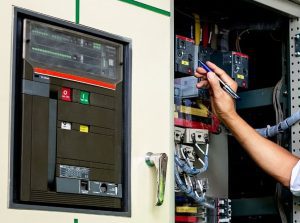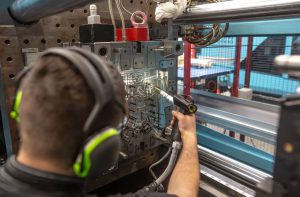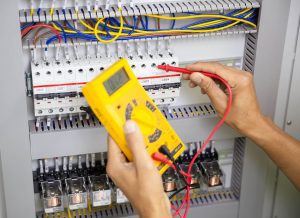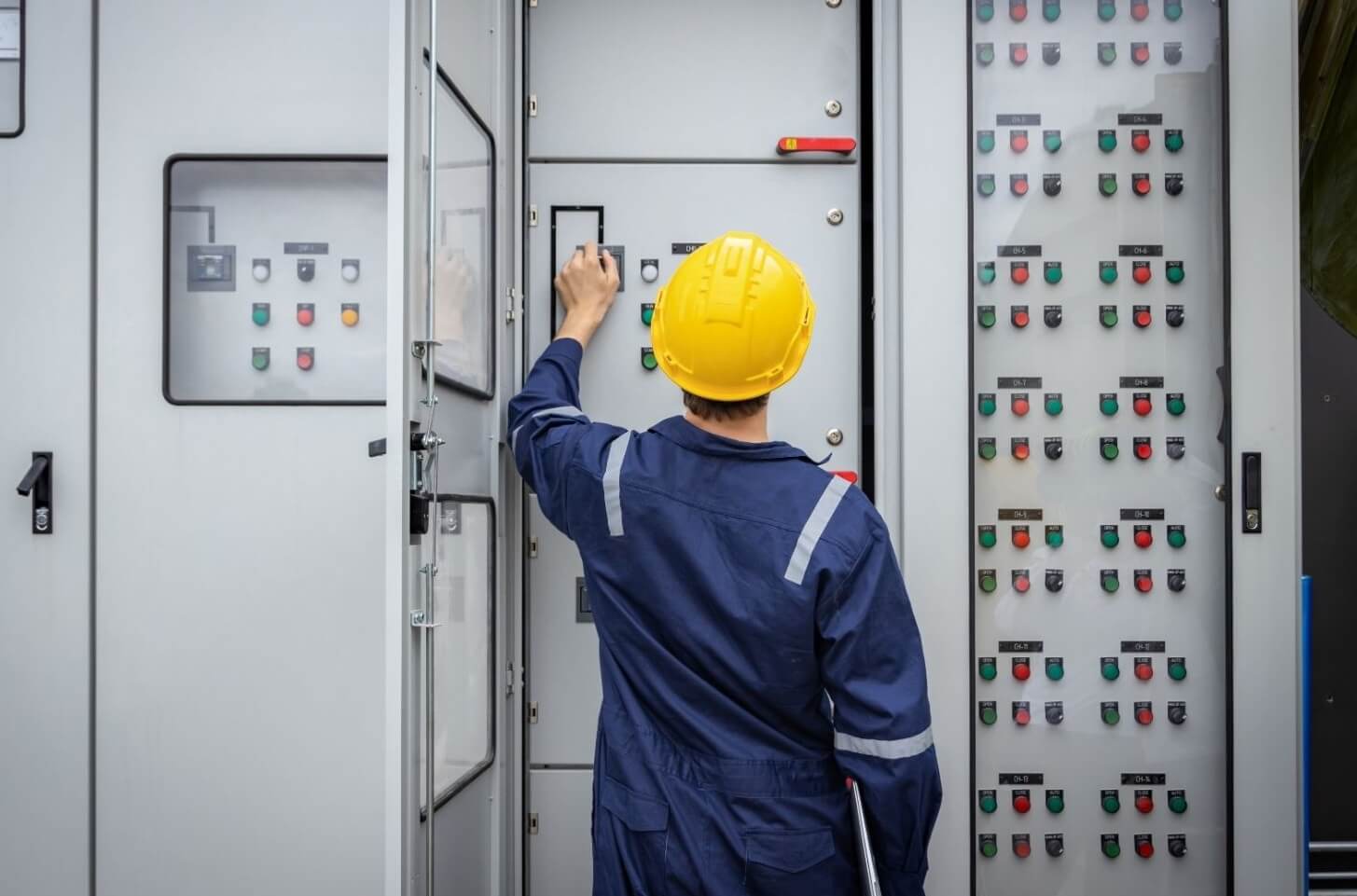What Are the Main Types of Maintenance Engineers?
You will need a selection of qualifications, work experience and certificates to become a maintenance engineer in the UK. The main task of maintenance engineers is to maintain, repair, and overhaul machinery, equipment, and systems within a broad range of industrial sectors to ensure the continuous operation of equipment and reduce downtime. Depending on the sector, maintenance engineers require different qualifications. Here are the main types:
- Mechanical Maintenance Engineer: Involved in the installation, maintenance and repair of mechanical systems and machine parts such as engines, turbines, pumps, and refrigeration and air-conditioning systems. Usually employed in Manufacturing, Automotive and Construction.
- Electrical Maintenance Engineer: Electrical Maintenance Engineers work on maintaining electrical systems, circuits, and machinery. Also known as maintenance electricians, these engineers work in power generation, telecoms, manufacturing, etc.
- Facilities Maintenance Engineer: Works on the maintenance of a building’s infrastructure, including HVAC (heating, ventilation, and air conditioning), plumbing, electrical systems, and other utilities.
- Industrial Maintenance Engineer: Industrial Maintenance Engineer Maintains the operability of production machinery, conveyors, and automated systems in industrial environments such as factories, processing plants, and warehouses.
- Civil Maintenance Engineer: This person ensures that infrastructure such as roads, bridges, dams, and tunnels is kept in good shape. They often work for the public sector or for construction companies.
- Aviation Maintenance Engineer: This position maintains and repairs aircraft engines, electronics, and mechanical parts for the aerospace industry, ensuring the aircraft can be operated safely and compliantly.
- Marine Maintenance Engineer: Repair and maintain ship machinery, engines and other marine equipment. The industry includes shipping, naval operations and offshore oil and gas.

What Does a Maintenance Engineer Do?
To become a maintenance engineer, you are responsible for ensuring that machinery, equipment, and systems are well maintained and that it stays that way to avoid breakdowns and halted production. This includes monitoring by performing checks and diagnostics and making necessary repairs and replacements. So, what exactly do they do? Here’s a breakdown of their core activities:
- Routine Maintenance and Inspections: To become a maintenance engineer, you inspect machinery and equipment regularly and perform small maintenance tasks to prevent breakdowns in the future. They also perform maintenance tasks such as greasing, tightening bolts, and cleaning equipment to avoid future problems.
- Fault Diagnosis and Repair: When machinery fails, maintenance engineers employ diagnostic tools to identify the anomaly’s cause. Once the fault is diagnosed, it can then be repaired or replaced, depending on the severity of the failure.
- Planning and Scheduling Maintenance: To become a maintenance engineer, you plan maintenance work based on the equipment’s needs and the production calendar. They ensure maintenance is conducted to minimise downtime while maintaining critical equipment availability.
- Installation and Testing New Equipment: When new machinery or systems are installed, maintenance engineers check that they have been installed correctly and that the equipment is working properly.
- Compliance with safety standards: To become a maintenance engineer, you ensure all equipment and systems comply with safety regulations. Maintaining the records of maintenance activity performed might also be a part of their work to meet health and safety requirements.
- Emergency Repairs: In case of a breakdown, whenever equipment fails to operate properly, maintenance engineers come into action to fix the problems and reduce downtime so that production or services can continue running smoothly.
- Upgrading Equipment: To become a maintenance engineer, you suggest and carry out changes to improve the efficiency and lifetime of machinery and systems.

Average Maintenance Engineer Salary
A maintenance engineer’s annual salary in the UK greatly depends upon their experience, industry and location. Here is some information regarding the maintenance engineer’s salary:
- Junior Engineer/ Engineer: A junior engineer can begin on £22,000 to £28,000 a year. The lower levels of the engineering career are great for learning from more experienced colleagues.
- Senior Maintenance Engineer: Several years of experience are required, and salaries range from £30,000-40,000 per year. Engineers specialising in certain areas, like automation or electrical maintenance, can earn more.
- Senior or Lead Maintenance Engineer: Senior maintenance engineers who lead teams or oversee supervisors can make £40,000 to £55,000+ annually, often in high-demand sectors such as aerospace, energy, or manufacturing.
Maintenance Engineer Skills
To be successful in a career as a maintenance engineer, you’ll need a combination of technical knowledge, problem-solving abilities, and hands-on experience. Here are the key skills required:
- Technical Expertise: To become a maintenance engineer, you must be skilled in understanding and working with mechanical, electrical, and electronic systems. This requires a deep knowledge of machinery, equipment, and tools used in various industries.
- Problem-Solving Skills: To become a maintenance engineer, you must be able to quickly identify and diagnose problems with equipment. Strong analytical thinking and troubleshooting abilities are essential for finding solutions and preventing future issues.
- Attention to Detail: Preventive maintenance and fault diagnosis require a keen eye for detail to catch potential problems before they escalate. Precision is key in tasks such as aligning machinery, calibrating instruments, and inspecting components.
- Manual Dexterity: To become a maintenance engineer, you work with tools and equipment that require dexterity and good hand-eye coordination. This skill is particularly important for repairing machinery and assembling or disassembling components.
- Communication Skills: To become a maintenance engineer, you often work as part of a team and need to communicate with managers, operators, and other engineers. They must explain technical issues clearly and ensure that all team members understand safety protocols and maintenance schedules.
- IT and Software Skills: As industries become more automated, maintenance engineers must be proficient with computer-based systems and software used to monitor and control machinery. This includes knowledge of diagnostic software, programmable logic controllers (PLCs), and computerized maintenance management systems (CMMS).
- Time Management: To become a maintenance engineer, you must be able to prioritize tasks and manage their time effectively, especially when working on multiple pieces of equipment or responding to urgent repairs.

Maintenance Engineer Tips
Here are some practical tips for aspiring maintenance engineers:
- Begin with a Relevant Qualification: Complete a degree, diploma or apprenticeship in Mechanical engineering, electrical engineering, mechatronics, or a related field. These qualifications will provide a great introduction to the technical basics of the job.
- Get Some Hands-On Experience: As stated earlier, hands-on experience is a fundamental requirement for maintenance engineering. You can begin as an apprentice or junior maintenance engineer, where you will learn practically and develop more hands-on skills.
- Keep abreast of industry trends: Maintenance engineering is a dynamic field, especially with automation and smart technologies on the rise. Learn about new tools, techniques and technologies by attending workshops, reading industry magazines and taking appropriate courses.
- Specialise: You can specialise in HVACs or other areas such as automation, robotics, or electrical maintenance. If you choose a high-demand area, this can increase your earning potential and career prospects.
- Work Safely: Work safely and never compromise health and safety. All plants must be maintained in accordance with up-to-date health and safety standards and their limitations. Don’t just do the bare minimum; do what you must do.

Maintenance Engineer Requirements
You will need a selection of qualifications, work experience and certificates to become a maintenance engineer in the UK. Here is a brief outline of the general requirements:
- Training: Most maintenance engineers have a degree, diploma or apprenticeship in mechanical, electrical or industrial engineering. Courses in engineering technology, mechatronics, and manufacturing systems are useful.
- Hands-on experience: You need to get your hands dirty. Many maintenance engineers start their careers as apprentices, receiving on-the-job training and exposure to various equipment.
- Certifications: Some occupations require standard certifications to work in them, such as electrical safety or HVAC maintenance certifications. Some may only require familiarity with standards like ISO 9001, while others may require knowledge of PLC programming.
- Health and Safety Training: To become a maintenance engineer, you need a sound, working knowledge of health and safety practices. Often, employers provide training in the appropriate health and safety standards and procedures and specific rules and regulations relating to the employer’s premises. But it’s also worth seeking first aid, fire safety, and electrical safety certifications.

How to Become a Maintenance Engineer
Here’s a step-by-step guide to becoming a maintenance engineer in the UK:
- Acquire a Suitable Qualification: Get a degree, diploma, or apprenticeship in mechanical engineering, electrical engineering, mechatronics or a related field. Apprenticeships are a great way to get that experience and a qualification.
- Get some experience: You can start by seeking entry-level positions or internships based on your maintenance engineering diploma, such as working for a small manufacturing company with on-site maintenance staff. You can also learn from the in-house maintenance engineer how to troubleshoot and repair various types of machinery.
- Get Certified: Depending on your specialisation, seek out certificates in electrical safety, HVAC maintenance, Health and Safety Regulations, etc. This will make you more market-ready.
- Keep refreshing your knowledge and stay up to date: To become a maintenance engineer, you should remain current by attending workshops or seminars or taking online courses, maintaining a professional attitude, adhering to standard practices, and keeping abreast of the latest trends in the field.
- Apply for Maintenance Engineer Jobs: Once you have the right qualifications and experience, apply to be a maintenance engineer. You should customise your CV to highlight technical skills, accreditations and any specific types of machinery you have experience working with.
Frequently Asked Questions
Why Should You Become a Maintenance Engineer?
As a maintenance engineer, you will benefit from a job with security, hands-on tasks, and sophisticated technology. Maintenance engineers are part of the technical team in various industries, ensuring that factories, plants, offices, or even hospitals run as efficiently and smoothly as possible. If you love technical work, solving problems relating to machinery and electrical equipment, and enjoying using sophisticated appliances, this career offers considerable potential for progression and development.
Is Being a Maintenance Engineer a Good Career Choice for You?
Do you enjoy working with machinery, tinkering with technical problems, paying attention to detail, and working with your hands? If so, a career as a maintenance engineer could be for you. Maintenance Engineering is an excellent choice for people who love getting their hands dirty and working in manufacturing, energy, aerospace, or facilities management. You’ll often work in fast-paced environments, with demand for maintenance engineers across industries. That means not only good job security but opportunities for career advancement. And since every maintenance operation relies on automation and high-tech machinery, maintenance engineering is closely tied to advanced technology. This means it’s constantly changing and provides many opportunities to learn and specialise.
Maintenance Engineer Salaries
In the UK, maintenance engineers’ salaries range from £22,000 to £55,000+ per year. Newly hired engineers earn around £22,000 to £28,000 per year. Those with experience can earn between £30,000 and £40,000. Senior or specialised engineers, like those working in aerospace or industrial settings, earn salaries of £40,000 to £55,000 or more.
Which Qualifications Can Help with a Career as a Maintenance Engineer?
Having a degree in mechanical, electrical, or industrial engineering really helps. But diplomas in engineering, Higher National Certificates (HNC), or apprenticeships in engineering or a related discipline are also valuable starting points. It is also useful to get additional certifications relevant to your sub-speciality, such as PLC programming, HVAC maintenance, or electrical safety.
Do I Need Experience to Get Started as a Maintenance Engineer?
Yes, practical experience is important to a maintenance engineer. Take a look at my CV. You will notice that many maintenance engineers start as apprentices or junior engineers, which involves learning how to diagnose and repair machinery. Entry-level work usually involves being trained on the job, in which you learn from senior engineers and acquire skills for moving up the ladder.
Maintenance Engineer Career Outlook
The demand for maintenance engineers is strong in the UK. It is projected to stay consistent across many sectors, including manufacturing, energy, healthcare, aerospace and construction. As more systems become automated, engineers need to maintain the machinery, robotics and sensor systems that power our modern world. Specialists in robotics or automation, for example, or those focusing on sustainable technologies, can further widen their horizons and choose from various career paths.
Maintenance Engineer Hierarchy and Progressing Within the Role
Maintenance engineers typically start as junior engineers or apprentices, learning the ropes through hands-on work with machinery and equipment. With experience, they can move into roles such as maintenance engineer, senior engineer or lead engineer. More experienced engineers might move into supervisory or management roles, overseeing a team of engineers and maintenance staff. Other career paths exist for specialising professionals, such as facilities management, automation systems, or maintenance planning.
Maintenance Engineer Exit Options and Opportunities
There are also several alternative careers for experienced maintenance engineers should they wish to move into a different role. Many move into related fields such as project management, maintenance planning or engineering consultancy. Many of the skills and knowledge developed as a maintenance engineer are equally relevant to technical sales, engineering design or quality control roles. There are also opportunities for engineers to deepen their knowledge and expertise in specific areas, such as specialist renewable energy systems, automation or HVAC.


